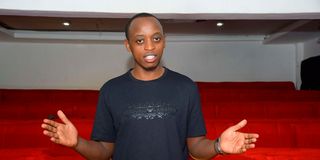He saw Nyeri artists struggle to get exposure, so he built a cinema

What you need to know:
- He charges Sh100 to audiences attending the two-hour live performances, which feature up to three artists at a time. Artists include musicians singing in either English, Kiswahili or Kikuyu or dancers, spoken word artists and actors.
- The proceeds from these shows are then equitably shared between him and the performing artists.
- To perfect the young artists’ talent, Wanyoike has incorporated the expertise of three seasoned directors and a producer
Upcoming artists grapple with many unspoken struggles – from cycles of unsuccessful auditions to back-to-back performances. Despite this, most of them remain focused on their dreams and dedicated to their craft.
Recognising this, David Wanyoike, a 28-year-old from Nyeri, established a hub that nurtures and trains stage artists, while providing a platform for them to showcase their talents.
Wanyoike, a trained media practitioner, started the venture dubbed Showtime Studios and Cinema as a photo studio back in 2020 in Nyeri town.
He recalls catering to diverse clients. Some wanted photographs while others were keen on video production.
“Many times, I found myself filming performances of artists showcasing skits and plays for promotional purposes. These events would attract onlookers, predominantly aspiring stage artists, who, although unable to afford our services, were intrigued by the craft,” he says.
When he diversified his business last year by adding a movie theatre, it piqued the interest of numerous local youths, especially college students.
He recognised a challenge that many artists faced: While hugely talented, they struggled to find media exposure. They were overly reliant on social media and local corporate events, which was not enough.
This inspired him to host artist performance nights at his cinema, an initiative that quickly gained traction as it is the county’s sole cinema offering such a platform.
Live performances are now hosted at the cinema every weekend.
He charges Sh100 to audiences attending the two-hour live performances, which feature up to three artists at a time. Artists include musicians singing in either English, Kiswahili or Kikuyu or dancers, spoken word artists and actors.
The proceeds from these shows are then equitably shared between him and the performing artists.
To perfect the young artists’ talent, Wanyoike has incorporated the expertise of three seasoned directors and a producer.
The experts have not only mentored the artists but also assisted them in producing videos, designing professional posters and promoting their brand on digital platforms.
Since its inception in October 2022, the cinema has impacted the lives of more than 40 artists. It has earned a reputation as the premier locale for promoters scouting for local talent.
He says that the challenges in the arts industry has seen many aspiring creatives abandon their talent and turn towards traditional occupations, thus leading unfulfilled lives
“A large number of artists under the hub are either from the informal sector or are jobless individuals residing in the slums. To them, artistry isn’t just a hobby, it is their identity. If deprived of this, they experience a profound sense of loss and disconnection,” he explains.
The venture is not without challenges. Wanyoike says that funding, ensuring quality training and managing the logistics of the growing number of the upcoming stage artists requires immense effort.
Currently, the venture is primarily dependent on the revenue earned from the stage performances, and his salary as a communication officer at a local organisation.
He says that financial constraints have kept him from establishing a recording studio. “Our videography is of exceptional quality but we are yet to match that in audio due to the lack of a recording studio,” he says.
But this is not just about arts and performances. Six months ago, Wanyoike started a partnership with a mental health non-governmental organisation.
Together, they engage the artists in dialogues about mental health. Topics range from drug and substance abuse, prompted by artists’ tendency to turn to drugs either as a coping mechanism or as a source of ‘inspiration”, to addressing challenges like burnout, depression and the financial strains associated with the unpredictable earnings in the industry.
The mental health discussions are held on Saturdays afternoon at the cinema and are free to the public. Given that a majority of his audience are young, Wanyoike says that they have begun incorporating national issues affecting young people in the sessions.
“The youth of today face numerous mental health challenges, and they don’t always have the capacity to overcome those challenges on their own. Our goal is to help them identify, understand and eventually navigate these struggles,” he explains.
To foster a comprehensive discourse on youth and mental health, Wanyoike says that he has taken to social media to widen his reach. Such dialogues and the live performances are now accessible online.
“While there is abundant support for the youth, it feels as if the government’s role has been more regulatory than about nurturing local artists,” he says, while lamenting that sectors like sports receive more attention.
Among the challenges he faces are insufficient support and recognition from government and the society, and bodies like the Music Copyright Society of Kenya (MCSK), that offer musicians low pay.




